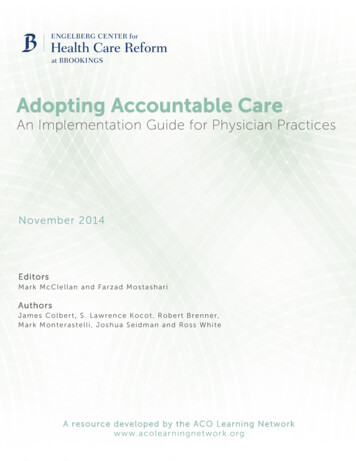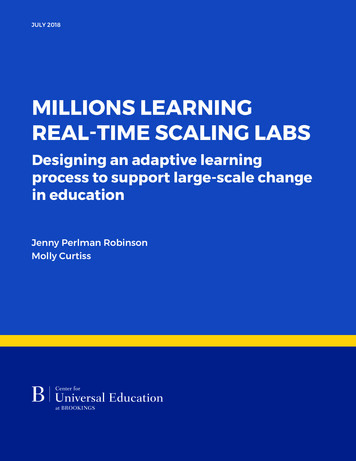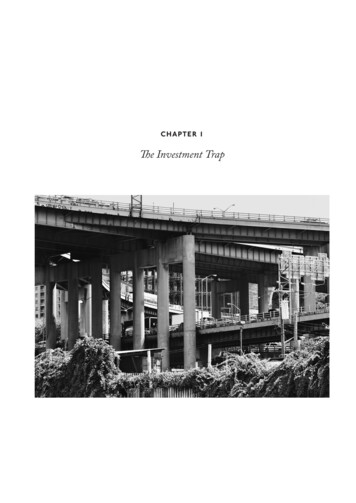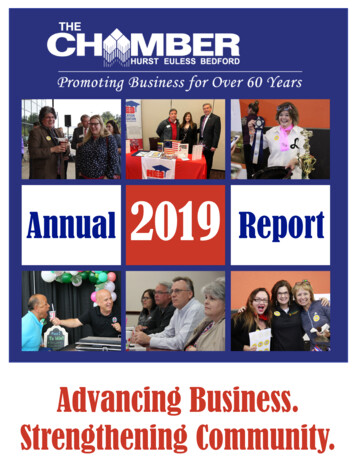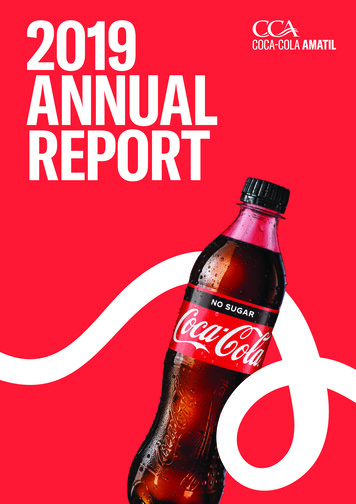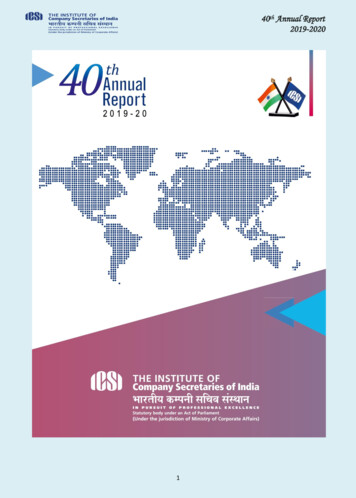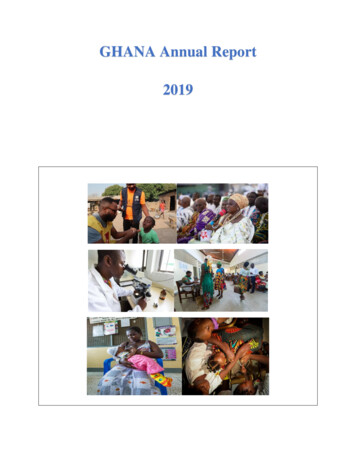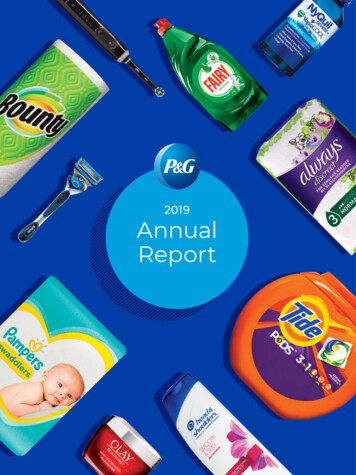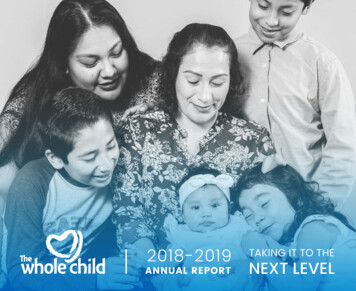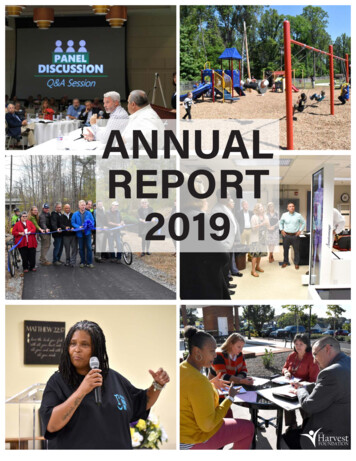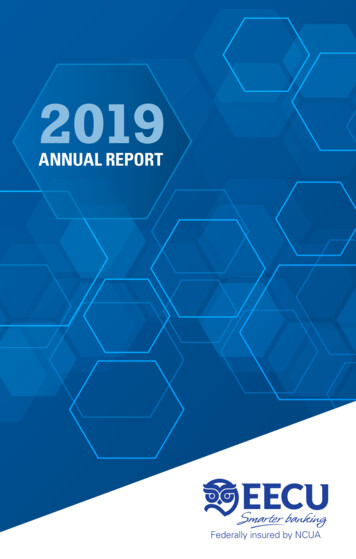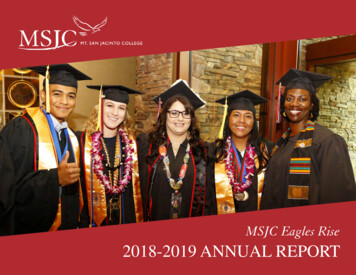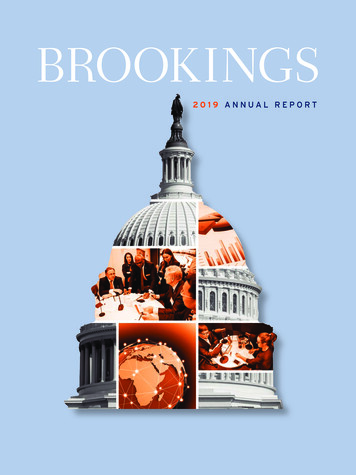
Transcription
2019 ANNUAL REPORT
B
PHOTO: SHARON FARMER PHOTOGRAPHYBrookings President John R. Allen addressesstaff at an Institution-wide town hallPOLICY LEADERSHIPFOR A CHANGING WORLDThe accelerating pace of geopolitical competition, technological change, and debate about America’s role inthe world demands an intensification of evidence-basedpolicy research, building on the democratic values that haveguided our nation since its founding. Brookings has a uniquerole to play in leading these efforts. Our scholarly communityworks every day to shore up the global world order throughhigh-quality, fact-based research that upholds and protectsnational and international norms. In everything that Brookingsdoes and how we choose to engage with the world, we are guidedby a respect for differences, civility of debate, and commitmentto indepedent thinking.1
CO-CHAIRS’ LETTERThe Brookings Institution is dedicated to providing independent and quality research thathelps improve our world. Our experts research the most challenging and consequentialissues facing us today. Brookings scholarship is distinguished not just in its academicrigor and objectivity, but also in its pragmatic and action-oriented approach. The complex issueswe grapple with have local, national, and global dimensions, and our scholars therefore work withpolicymakers in local and state governments, in Washington, and in capitals around the worldto deliver impact. Beyond political leaders and decisionmakers, Brookings is also committedto engaging all of civil society to identify, analyze, and communicate workable solutions to themost pressing challenges. We have a guiding belief that a well informed and engaged citizenryis essential to a safer, more secure and prosperous world.In an increasingly polarized environment of political partisanship, rigid ideologies, turbocharged disinformation, and personal enmities—Brookings provides an alternative. We believeit is vital to offer a forum for people of good faith and differing views to come together to analyzea common set of facts and problem-solve the issues. Since its founding, Brookings has supportedcivil discourse through the open exchange of ideas supported by empirical research and analyses. With democratic principles under sustained attack, increased geopolitical competition forhuman and natural resources, and revolutionary technologies affecting society at all levels, weneed Brookings more than ever as a trusted source of evidence-based inquiry and thoughtfulpolicy solutions.Substantial resources are needed to undertake the critical, comprehensive, and courageousBrookings research agenda. On behalf of our colleagues on the Board of Trustees and ourpresident, John Allen, we are grateful to everyone who has provided financial support.Glenn H. HutchinsCo-Chair of the Board2PHOTO: COURTESY OF SUZANNE NORA JOHNSONPHOTO: BRIAN STANTONThe gifts and grants that we receive come from a broad and diverse set of contributors.This support allows us to sustain the quality, independence, and impact of our research—whichare the hallmarks of Brookings scholarship. As we look to the urgent challenges that we will becalled on to address in the coming year, we will do all that we can to preserve the trust that ourdonors have placed in us to advance the mission of the institution.Suzanne Nora JohnsonCo-Chair of the Board
PRESIDENT’S LETTERFor over 100 years, the Brookings Institution has helped develop critical public policysolutions in response to some of society’s most intractable problems. We continue to beone of the top-rated and most respected think tanks globally, advancing the public goodin a dynamic geopolitical environment shaped by disruptions to the liberal world order, thebifurcation of the international system, and political fragmentation at all levels of governance.In the pages that follow, you will find highlights of our achievements over the past year. I amthankful to serve alongside dedicated and talented colleagues, and I invite you to explore ourwebsite, brookings.edu, for more of their outstanding work.Brookings delivers impact because the content and tone of our scholarship exemplifies adiverse range of perspectives and backgrounds, respect for differences, civility of debate, andcommitment to independent, nonpartisan thinking. As a result, our scholarship is synonymouswith excellence and innovation across a wide range of policy areas. There are many examplesworth highlighting but the following are a few standouts: the Hutchins Center, which is helpinglead the policy community in tackling fiscal and monetary policy challenges in the macroeconomicenvironment; Lawfare’s groundbreaking analysis of the Mueller Report; the Metropolitan PolicyProgram’s cutting-edge analysis of the tech economy and its impact on local economies; ForeignPolicy’s work to understand and help problem-solve around challenges to multilateralism; and theidentification of an emerging global middle class by the Global Economy and Development program.In a day and age defined by hyperpartisanship and the devaluation of facts, our commitment toquality, independence, and impact has never been more important or relevant.These guiding principles lend themselves to our conviction that people with significantlydifferent policy positions can and should agree on a common set of facts and trade-offs. OurPolicy 2020 micro-website, which launched this fall, includes “Voter Vitals,” a series of primerson policy issues in the campaign crafted to pop up when someone watching a presidentialdebate Googles “What is the wealth tax?” or “What is Medicare for All?” The Voter Vitalsreflect our shared belief that scholarship operates on a common understanding of basic factsand that Brookings is the place to turn to for this type of digestible, yet rigorous analysis.With our deep bench of top experts, we will continue to help drive the national debate andconversation from now until Election Day.PHOTO: PAUL MORIGIBrookings has a critical role to play at this moment inhistory, but we can’t do it alone. Only through the financialsupport of our friends and donors are we able to invest inresearch that promotes understanding, prosperity, respectand tolerance, and security around the globe. In a world inwhich opinions are plentiful and in-depth analysis is oftenhard to find, Brookings rises above the noise and deliverspractical, effective solutions for the betterment of all.John R. AllenPresident3
ECONOMIC STUDIESPHOTO: RALPH ALSWANGECONOMIC CHALLENGES REQUIRE NEWSOLUTIONS AND A LONG-TERM VIEWExperts in Brookings’s Economic Studies program drive debates on U.S. economic performanceand prosperity, both inside and outside the Beltway. Strong hiring and falling unemployment bodewell for workers, but several challenges including economic mobility, record levels of student debt,and low productivity growth require fresh thinking for long-term solutions. To lead the charge,Brookings welcomed Stephanie Aaronson as Vice President and Director of Economic Studies inNovember after nearly two decades as a labor economist at the Federal Reserve Board. Aaronsonleads 60 resident and nonresident scholars in research to promote sound fiscal and monetarypolicy, social mobility, a strong labor market, and broad-based economic growth.STUDENT LOANS AND THE GROWING DEBT LOADAmericans hold nearly 1.4 trillion in outstanding education debt—the second largestsource of household debt after housing, and the only form of consumer debt that hasmetastasized since the Great Recession. Policymakers agree we are experiencing acrisis but disagree on the solution. Through reports and blog posts, Senior FellowAdam Looney illuminated the root of the problem and offered recommendationsfor a progressive and coherent loan relief policy. As candidates for the 2020 U.S.presidential elections unveiled their own solutions, Looney analyzed each—providinginvaluable resources for both voters and policymakers. Additionally, with federal loansand grants playing a central role in financing investments in education, especiallyfor low- and middle-income families, Looney testified to the Senate Committee onHealth, Education, Labor, and Pensions on reauthorizing the Higher Education Actto strengthen accountability to protect these students and taxpayers.4ABOVE: Senior Fellow Adele Morrishosted Senator Chris Coons (D-DE)and Representative Francis Rooney(R-FL) (from left) to explore thepotential for common ground onclimate change. Morris’ work wasincorporated into Rooney’s EnergyInnovation and Carbon Dividend Actof 2019 and Coons’ Climate ActionRebate Act of 2019
The Center on Regulation and Markets continued to update itsderegulation tracker, which monitors delayed, repealed, and newrules, and guidance and policy revocations, along with importantcourt battles on the environment, health, labor, and other hot-button topics. Work on real-time payments—how to eliminate the gapbetween when checks are deposited and funds are available—byFellow Aaron Klein and other scholars associated with the Centerattracted the attention of several members of Congress includingSen. Chris Van Hollen (D-MD), Rep. Gregory Meeks (D-NY) andthe Congressional Black Caucus, as well as Sen. Pat Toomey (R-PA).The Future of the Middle Class Initiative (FMCi) and theCenter on Children and Families raise important questions aboutequity, access, mobility, and prosperity. FMCi scholars IsabelSawhill and Richard Reeves made in-roads to Congress this yearon critical issues related to middle class mobility and prosperity,advising Sen. Ben Sasse (R-NE) and Sen. Mark Warner (D-VA),as well as the senior counsel for the Democratic House Ways andMeans Committee. FMCi was also able to inform thinking aroundthe college admissions scandal—Reeves and Research AnalystKatherine Guyot’s op-ed on BBC.com, “U.S. College Scandal: HowMuch Difference Does Going to a Top University Make?,” receivedmore than one million views in 24 hours.“Being at Brookings in the worldof ideas for me is like thejournalistic equivalent of a spaday. So, thank you very much toBrookings, I appreciate that.”— RUTH MARCUS, DEPUTY EDITORIAL PAGEEDITOR, THE WASHINGTON POSTPHOTO: PAUL MORIGIFAIRNESS, PROSPERITY, ANDMIDDLE-CLASS MOBILITYNEW SOLUTIONS REQUIRE NEWMEASUREMENT TOOLSSenior Fellow Richard V. Reeves, the John C. and NancyD. Whitehead Chair, Co-Director of the Center on Childrenand Families, and Director of the Future of the Middle ClassInitiative, introduces an event focused on how housing policiesaffect the well-being of the middle classPHOTO: PAUL MORIGIThe Hutchins Center on Fiscal and Monetary Policy, with renewedsupport from the Hutchins Family Foundation, launched a year-longProductivity Measurement Initiative to contribute to the continuing debate about what the economic slowdown really means, andhow much of it reflects the inadequacy of official measures. TheInitiative includes events and reports that explore how we measureproductivity and the policy challenges that lie ahead. The HutchinsCenter, in partnership with the Yale School of Management’sProgram on Financial Stability, convened Distinguished FellowBen Bernanke and former Treasury Secretaries Tim GeithnerNinety-One Years Later, a Coda to Groundbreaking WorkFor a symposium on American Indian gaming and its impact on tribal communities, DavidM. Rubenstein Fellow Randall Akee drew on Brookings’s legacy to find new perspectives onpolicy and prosperity. In 1928, the Brookings Institution (then known as the Institute forGovernment Research) published a study by Lewis Meriam on the economic and social conditions of Indian Reservations in 26 states, an early and important contribution to the studyof American Indian life. Akee used the Meriam Report as a starting point for looking at howthe tribal gaming industry has influenced American Indian life and economics. The symposium’s discussants identified challenges, opportunities, and implications for the industryand tribal citizens alike. Following the event, several participants shared their experiencesand opinions on American Indian gaming and its effects on their communities in a shortvideo. Both the video and symposium received significant attention from American Indiancommunities and provided vital visibility to the emerging economic issues they face.Jonodev Chaudhuri, Chair of theNational Indian Gaming Commission,opens an event on the future ofAmerican Indian gaming5
Outgoing FDA Commissioner Scott Gottlieb (left) and DavidWessel, Director of the Hutchins Center on Fiscal and MonetaryPolicy, ahead of an event on efforts to regulate youth vapingand tobacco use, dietary supplements, and reforming theagency’s oversightand Hank Paulson to assess the government’s response to thefinancial crisis and how we might do better next time given thechanges in the political and regulatory environment. The HutchinsCenter hosted a two-day conference and commissioned papers byexperts who were actively involved in designing the elements ofthe rescue, which will result in a new book edited by Bernanke,Geithner, Paulson, and Senior Fellow Nellie Liang entitled FirstResponders: Inside the U.S. Strategy for Fighting the 2007–2009Global Financial Crisis.In May 2019, The Hamilton Project, in collaboration with theWashington Center for Equitable Growth, hosted a policy forumand published Recession Ready: Fiscal Policies to Stabilize theAmerican Economy, which offers policy proposals to make currentprograms—including unemployment insurance, nutrition assistance,employment subsidies, and infrastructure spending—more effectiveas automatic stabilizers during the next economic downturn. Thebook garnered coverage in The New York Times, The Washington Post,The Economist, and The Financial Times, among others.The Hamilton Project also published Placed-Based Policiesfor Shared Economic Growth, which was released in conjunctionwith a September 2018 policy forum featuring former Governor ofMassachusetts Deval Patrick an
the Congressional Black Caucus, as well as Sen. Pat Toomey (R-PA). The Future of the Middle Class Initiative (FMCi) and the Center on Children and Families raise important questions about equity .
